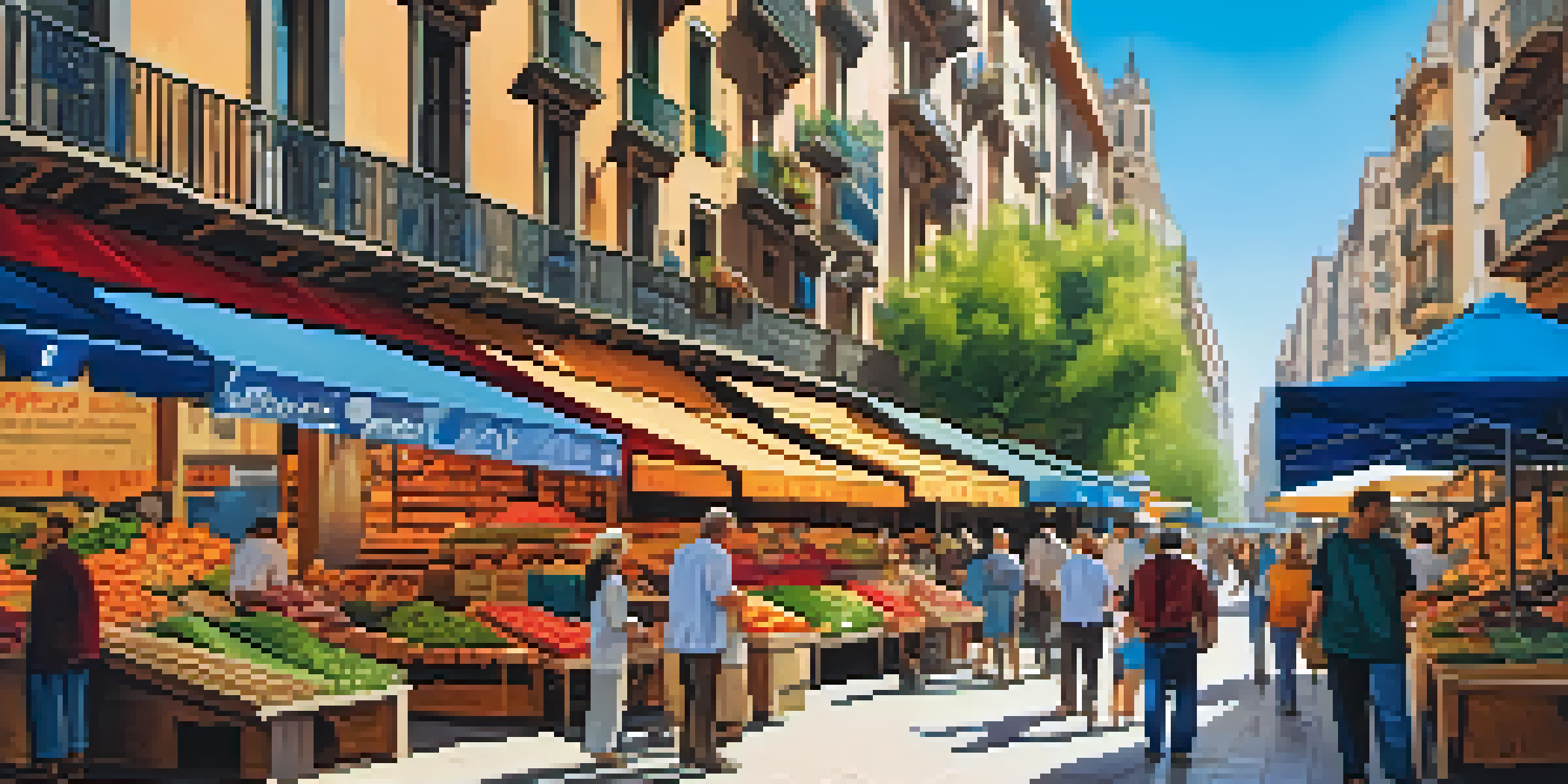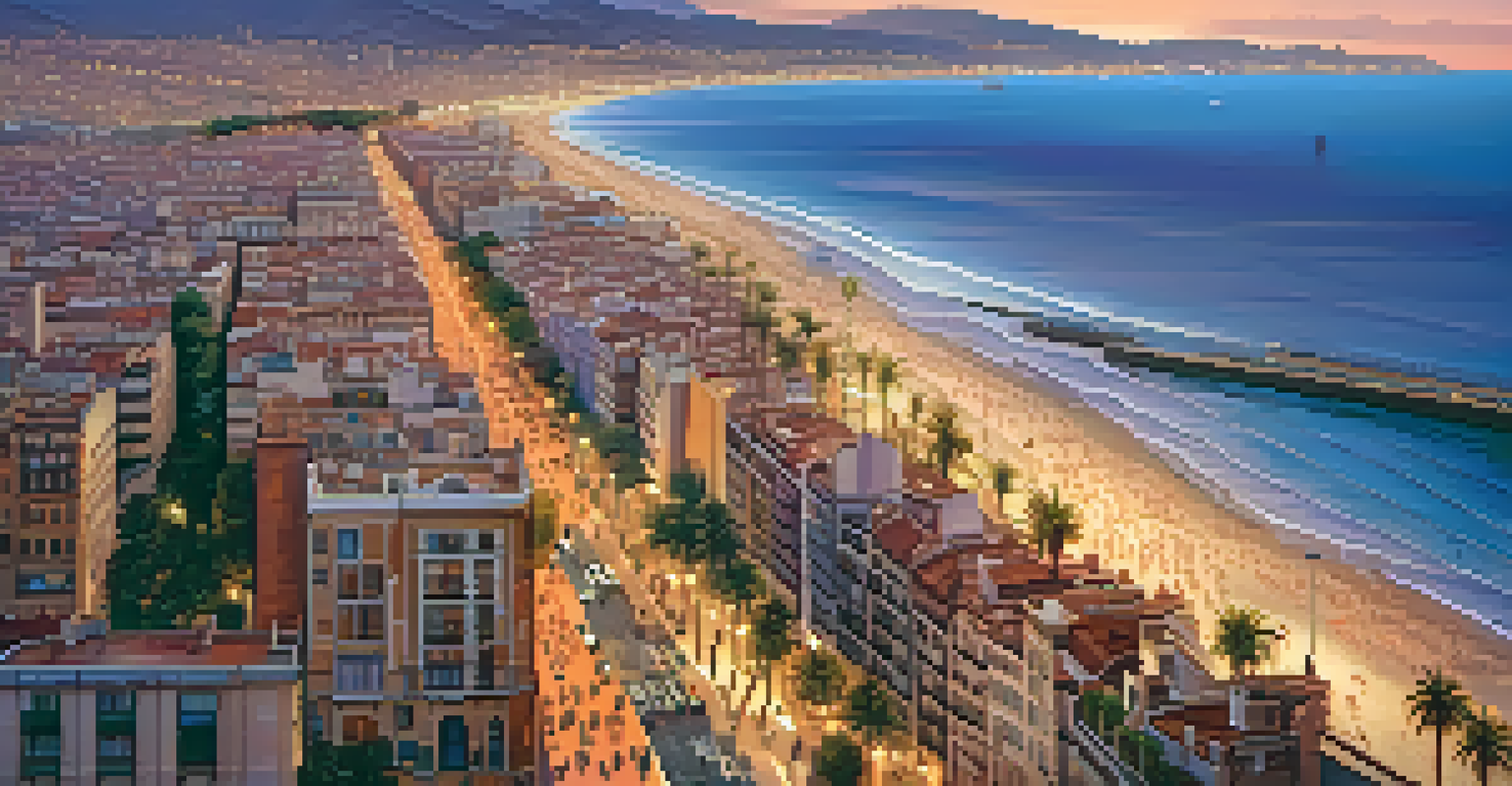Urban Tourism and Local Communities: Barcelona's Experience

Understanding Urban Tourism in Barcelona's Context
Urban tourism refers to the trend of travelers seeking experiences in cities, particularly focusing on culture, history, and local lifestyles. In Barcelona, this phenomenon is vibrant, drawing millions of visitors each year who are eager to explore Gaudí's architecture, bustling markets, and rich Catalan traditions. However, this influx of tourists brings both opportunities and challenges for local communities.
Tourism is not just about the places you visit; it's about the connections you make and the experiences you share.
The city's unique blend of modernity and tradition makes it a prime destination, but it also places pressure on local resources and infrastructure. Residents often find themselves navigating the delicate balance between welcoming tourists and preserving their own way of life. Understanding this dynamic is crucial for fostering a sustainable tourism model that benefits everyone.
As urban tourism evolves, so does the relationship between visitors and locals. Engaging with the community through respectful tourism practices can lead to enriching experiences for both tourists and residents, creating a cultural exchange that enhances the city's vibrant atmosphere.
Economic Benefits of Urban Tourism for Local Residents
One of the most immediate benefits of urban tourism is its positive impact on the local economy. In Barcelona, tourism generates significant revenue, creating jobs in hospitality, retail, and various service sectors. This influx of income allows local businesses to thrive and provides residents with employment opportunities that may not have existed otherwise.

Moreover, when tourists spend money in local shops, restaurants, and attractions, they contribute to the community's financial health. This economic boost can lead to better public services, infrastructure improvements, and an overall enhanced quality of life for residents. It's a win-win situation when managed responsibly.
Balancing Tourism and Local Life
Barcelona faces the challenge of balancing the benefits of urban tourism with the preservation of local lifestyles and community well-being.
However, it's essential that the economic benefits of tourism are distributed equitably among the community. Ensuring that local businesses, especially small enterprises, are prioritized can help maintain the authenticity of Barcelona while also benefiting its residents. This approach fosters a sense of pride among locals as they share their culture with visitors.
Cultural Exchange: The Heart of Urban Tourism
Cultural exchange is a key component of urban tourism, and Barcelona offers a rich tapestry of traditions just waiting to be shared. When tourists engage with locals—whether through cuisine, music, or festivals—they create memorable experiences that celebrate the city's heritage. This interaction can foster understanding and appreciation of diverse cultures.
Sustainable tourism is about creating a better place for people to live in and a better place for people to visit.
For instance, events like La Mercè, the city's annual festival, allow tourists to immerse themselves in Catalan customs and connect with the community on a deeper level. These moments can break down cultural barriers and promote a sense of global unity, enriching the travel experience for everyone involved.
However, it's crucial for both tourists and locals to approach these interactions with respect and openness. By valuing each other's perspectives, urban tourism can become a powerful tool for cultural diplomacy, allowing Barcelona's unique identity to shine while inviting others to partake in its vibrant narrative.
Challenges of Urban Tourism for Local Communities
While urban tourism brings many benefits, it also presents significant challenges for local communities. Issues such as overcrowding, noise pollution, and rising living costs can create friction between residents and tourists. In Barcelona, some neighborhoods have experienced a surge in short-term rentals, making it difficult for locals to find affordable housing.
This phenomenon has led to protests and calls for stricter regulations on tourist accommodations. Communities are increasingly advocating for a balance between tourism and their everyday lives, emphasizing the need for policies that protect residents' rights and well-being. It's a complex issue that requires collaboration between local governments, residents, and the tourism industry.
Economic Gains for Residents
Urban tourism generates significant revenue for Barcelona, creating jobs and enhancing the quality of life for its residents.
Addressing these challenges is essential for sustainable urban tourism. Initiatives that promote responsible tourism practices, educate visitors about local customs, and involve residents in decision-making can help mitigate the negative impacts while preserving the city's charm.
Sustainable Practices for Urban Tourism in Barcelona
Sustainability is becoming a guiding principle for urban tourism, and Barcelona is at the forefront of this movement. The city has implemented various strategies aimed at minimizing the environmental impact of tourism while enhancing the quality of life for its residents. Initiatives such as promoting public transportation and encouraging eco-friendly accommodations are steps toward a greener future.
Local organizations and businesses are also getting involved, offering tours that highlight sustainable practices, like visiting organic markets or participating in community clean-up efforts. These experiences not only educate tourists but also empower locals to take an active role in preserving their city.
By prioritizing sustainability, Barcelona aims to create a tourism model that respects both the environment and its communities. This approach not only attracts eco-conscious travelers but also ensures that future generations can continue to enjoy the city's beauty and culture.
Community Engagement: Involving Locals in Urban Tourism
Engaging the local community in urban tourism planning is crucial for creating a balanced approach that benefits everyone. Barcelona has recognized the importance of involving residents in tourism-related decisions, allowing them to voice their concerns and contribute ideas. This collaborative effort fosters a sense of ownership and pride among locals, making them active participants in shaping the visitor experience.
Workshops, town hall meetings, and surveys are some of the methods used to gather input from residents. By understanding the community's needs and desires, tourism strategies can be tailored to reflect local values and enhance the overall experience for both tourists and residents alike.
Emphasizing Sustainable Practices
Barcelona is adopting sustainable tourism practices to minimize environmental impact while fostering community engagement and pride.
Ultimately, when locals feel heard and valued, they are more likely to welcome visitors with open arms. This mutual respect can lead to a more harmonious relationship between tourists and residents, enriching the cultural landscape of Barcelona.
The Future of Urban Tourism in Barcelona
As Barcelona continues to navigate the complexities of urban tourism, the future looks promising with a focus on sustainability and community engagement. The city is committed to finding innovative solutions that balance the needs of tourists and residents, ensuring that the essence of Barcelona remains intact. This forward-thinking approach is essential for maintaining the city's charm while adapting to the evolving tourism landscape.
Emerging trends, such as the rise of slow tourism, encourage visitors to take the time to explore and appreciate the local culture rather than rushing through a checklist of attractions. This shift in mindset can lead to more meaningful interactions and a deeper understanding of the community.

With ongoing efforts to promote responsible tourism and foster a sense of belonging among all stakeholders, Barcelona has the potential to set an example for cities worldwide. By prioritizing the well-being of its residents while welcoming visitors, the city can ensure a vibrant, sustainable future for urban tourism.